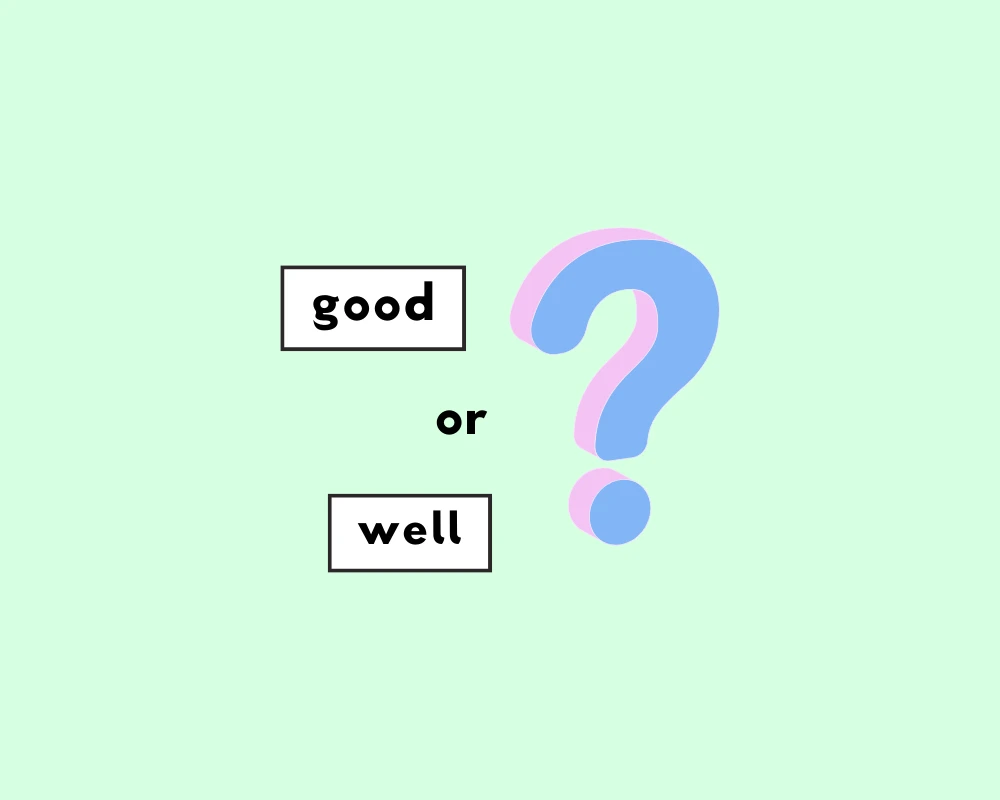Is your day going good or well? And is it, I hope you’re ‘well’ or ‘good’? These words are some of the most common words to appear in email and business correspondences. Let’s acknowledge the difference.
I feel well today.
She is a good student.
I feel good today.
She is a well student.
How to use good vs. well
Compare how good and well appear in these sentences:
- I hope your day is going well.
- I hope it’s been a good day.
The first sentence uses ‘well’ to modify ‘is going’, which are verbs or verb forms. Since ‘well’ is modifying a verb, this classifies it as an adverb, because adverbs modify verbs.
Conversely, ‘good’ is describing the ‘day’; i.e., a noun, making it an adjective, since adjectives describe nouns. In other words, we use ‘well’ to describe actions or states, and ‘good’ to describe people, places or things.
- Good is a noun that refers to “the amount of confidence and enthusiasm, etc. that a person or a group has at a particular time”.
- Well is mostly an adjective that describes being “connected with principles of right and wrong behaviour”. As a noun, morals refers to “standards or principles of good behaviour”
“Good” / “well”, used in sentences
| Examples: “good”, used in sentences |
|---|
| The piano was in good condition.
Your work is just not good enough. The results were pretty good. |
| Examples: “well”, used in sentences |
|---|
| They played well in the tournament.
The team work well together. The kids all behaved well. The conference was very well organized. |
Good, synonyms
- acceptable
- excellent
- exceptional
- favorable
- great
- marvellous
- positive
- satisfactory
- satisfying
- superb
- valuable
- wonderful
“good” vs. “well,” associate “good” with nouns (describing them) and “well” with verbs (modifying actions).
Well, synonyms
- adequately
- easily
- far
- freely
- fully
- properly
- quite
- right
- smoothly
Word origin (of good/well)
Old English gōd (with a long “o”) “excellent, fine; valuable; desirable, favorable, beneficial; full, entire, complete;” of abstractions, actions, etc., “beneficial, effective; righteous, pious;” of persons or souls, “righteous, pious, virtuous;” probably originally “having the right or desirable quality,” from Proto-Germanic *gōda- “fitting, suitable”.
“in a satisfactory manner,” Old English wel “abundantly, very, very much; indeed, to be sure; with good reason; nearly, for the most part,” from Proto-Germanic *wel-…from PIE root.
Read about other misused words
| Commonly misused words | UK English vs. US English |
|---|---|
| former vs. latter | burned or burnt? |
| bear with vs. bare with | color or colour? |
| breathe or breath | favorite vs. favourite |
| compliment vs. complement | smelled or smelt? |
| effect vs. affect | gray or grey? |
| elude or allude | favor vs. favour |
| it’s or its | analyze or analyse? |
Sources
- Oxford Learner’s Dictionary on “good” and “well”. Accessed 23 March, 2024.
- Harper, Douglas. “Etymology of well.” Online Etymology Dictionary, https://www.etymonline.com/word/well. Accessed 23 March, 2024.
Work Sheet
According to the post, which word is generally used to describe a noun?
Which word is generally used to modify a verb or verb phrase, describing an action or state?
Based on the examples provided, choose the grammatically correct sentence:
Choose the correct word to complete the sentence: “The kids all behaved ______.”
According to the post’s Usage Note, which sentence is considered grammatically correct regarding one’s state?
He is a very _______ person to have around.
She doesn’t speak English very _______.
They played _______ in the tournament.
That was a _______ idea!
I hope your day is going _______.
Frequently Asked Questions
How do I use “good”?
+
How do I use “well”?
+
What do good and well modify?
+
Is “I feel good today” correct?
+
How can I remember the difference?
+
Yash, D. "Good vs. Well (Usage + Examples)." Grammarflex, Jun 15, 2025, https://www.grammarflex.com/good-vs-well-usage-examples/.











